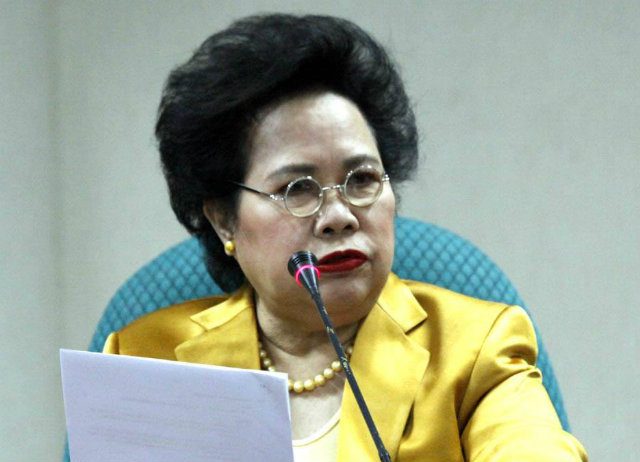SUMMARY
This is AI generated summarization, which may have errors. For context, always refer to the full article.


MANILA, Philippines – Despite the amendments, the version of the proposed Bangsamoro basic law (BBL) approved at committee level in the House of Representatives failed to address “constitutional infirmities.”
Senator Miriam Defensor Santiago issued the statement on Thursday, May 21, as she released the report on the BBL that the Senate committee on constitutional amendments and revision of codes prepared.
Changing the name of the measure from “Bangsamoro Basic Law” to the draft “Basic Law of the Bangsamoro Autonomous Region” won’t cure constitutional issues, Santiago said.
“The words ‘basic law’ are attached to the name. ‘Basic law,’ in legal construction, is a synonym for ‘constitutional law’ and ‘organic law,’” the senator said, citing her committee report on the BBL draft, pending as Senate Bill Number 2408.
Santiago’s committee report stood firm on the position that the BBL creates a substate similar to the juridical entity envisioned under the ill-fated Memorandum of Agreement on Ancestral Domains, which the Supreme Court declared as unconstitutional in 2008.
The senator maintained the the Constitution would need to be amended to accommodate the current draft of the BBL.
A product of the peace accord between the government and the Moro Islamic Liberation Front, the law seeks to create an enhanced autonomous region in Mindanao.
Objections
Government chief negotiator Miriam Coronel Ferrer said the House retained the 3 most important elements of the proposed law: the parliamentary of government, the automatic block grant, and the layered voting process.
The BBL lists down 3 types of powers: reserved powers for the national government, powers exclusive to the Bangsamoro, and concurrent powers between the two.
They were all retained by the House committee, but Santiago argued that granting Bangsamoro exclusive powers and use of natural resources found in the area is unconstitutional. She also criticized provisions designed to raise the capacity of the Bangsamoro to raise revenues.
“Effectively, the Bangsamoro government will have seceded from, yet remain financially supported by, the Philippine government,” she added.
Santiago said the law should provide a minimal threshold of competencies to ensure that the national sovereignity of the Pjilippines remains intact.
Santiago’s report recommended the revision of the BBL, especially on the proposed parliamentary form of government and how it would function alongside the national government.
“Instead of implying a transfer of sovereignty from the national government to the Bangsamoro Government, the BBL should observe the principle of subsidiarity as a way to allocate decision-making power,” the senator said in her first recommendation.
Aside from Santiago, 6 senators have signed the report: Juan Edgardo Angara, Jinggoy Estrada, Ferdinand Marcos Jr, Aquilino Pimentel III, Vicente Sotto III, and Cynthia Villar. Senators Ralph Recto and Lito Lapid are set to sign the report on Monday, May 25.
Santiago’s report will be incorporated into the final committee report to be prepared by the Senate local government comittee led by Marcos.
Read the Santiago committee report below:
– Rappler.com
Add a comment
How does this make you feel?
There are no comments yet. Add your comment to start the conversation.